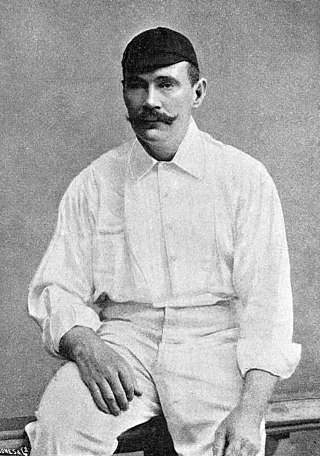Related Research Articles

The International Cricket Council (ICC) is the global governing body of cricket. It was founded as the Imperial Cricket Conference in 1909 by representatives from Australia, England, and South Africa. It was renamed as the International Cricket Conference in 1965 and adopted its current name in 1987. The ICC has its headquarters in Dubai, United Arab Emirates.
Charles Bannerman was an English-born Australian cricketer. A right-handed batsman, he represented Australia in three Test matches between 1877 and 1879. At the domestic level, he played for the New South Wales cricket team. Later, he became an umpire.
Ellawalakankanamge Asoka Ranjit de Silva is a Sri Lankan former cricketer and umpire who played in 10 Test matches and 28 One Day Internationals from 1985 to 1992. He was educated at Isipathana College, Colombo.
The Elite Panel of ICC Umpires is a panel of cricket umpires appointed by the International Cricket Council to officiate in Test matches and One Day Internationals around the world. The panel was first established in April 2002 when the ICC decided to reform the way that international cricket was umpired. The main change was that both umpires in a Test match and one of the umpires in a One Day International were now independent of the competing nations, whereas before 2002 just one of the umpires in a Test was independent and in ODIs both umpires were from the home nation. The majority of these ICC appointments are fulfilled by the members of the Elite Panel, who are generally thought to be the best umpires in the world. As such the ICC hopes to ensure that umpiring standards are as high as possible. Members of the panel stand in around 10 Tests and 15 ODIs each year. The list of umpires in the panel is revised every year by the ICC Umpires Selection Panel.
John Harry Hampshire, also known as Jack Hampshire, was an English cricketer and umpire, who played eight Tests and three One Day Internationals (ODIs) for England between 1969 and 1975. He played first-class cricket for Yorkshire from 1961 to 1981, and for Derbyshire from 1982 to 1984. Overseas, he was a successful captain of Tasmania in the period before the state was included in the Sheffield Shield. He was also appointed President of Yorkshire County Cricket Club in 2016, serving until his death a year later.

Patrick George McShane was an Australian cricketer who played in three Test matches between 1885 and 1888.
Jack Hart may refer to:

James Phillips was a Victorian first-class cricketer and Test match umpire.
Thomas Francis Brooks was an Australian former first-class cricketer and later an umpire. Born in Paddington, New South Wales, Brooks played first-class cricket for New South Wales.
John Richard Collins was an Australian cricket Test match umpire.
Peter Robert Enright, was an Australian cricket Test match umpire.
Stephen James Davis is a former Australian Test cricket match umpire, from South Australia. He was appointed to the Elite Panel of ICC Umpires in April 2008.

John Drake ("Jack") Scott was an Australian cricketer and Test match umpire. Scott played as a right-arm fast bowler and was also a useful lower-order right-handed batsman. He was the first man to dismiss Don Bradman in first-class cricket, in December 1927. Scott went on to umpire fifty games, including ten Ashes tests.
The New Zealand national cricket team toured South Africa from November 1994 to January 1995 and played a three-match Test series against the South Africa national cricket team. The tour was the third time that New Zealand had visited South Africa and their first tour to the country since the end of the apartheid regime which had led to a sporting boycott of South Africa. South Africa won the Test series 2–1, despite New Zealand having won the first match of the series - the first time that a side had lost a three-match series after having led since 1888 when Australia had lost against England. New Zealand also competed in the Mandela Trophy with South Africa, Sri Lanka and Pakistan but were eliminated in the group stage, not winning any of their matches.
The International Panel of ICC Umpires was established by the ICC in 1994 following trial in 1992/3, to ensure that one neutral umpire would stand in every Test match. It is made up of officials nominated from each of the twelve Test playing cricket boards. From 2002, its role in Tests was largely supplanted by the Elite Panel of ICC Umpires.
Barry Dudleston is a former first-class cricketer and umpire. He was a right-handed batsman and occasional wicketkeeper who played cricket for Leicestershire, Gloucestershire and Rhodesia. By the end of his 295 first-class games career, he had made 14,747 runs at 32.48, with 32 hundreds and 241 wickets.
Hart-Davis is a surname. Notable people with the surname include:

Jack Marsh was an Australian first-class cricketer of Australian Aboriginal descent who represented New South Wales in six matches from 1900–01 to 1902–03. A right-arm fast bowler of extreme pace, Marsh had high athletic qualities and was regarded as one of the outstanding talents of his era. His career was curtailed by continual controversy surrounding the legality of his bowling action; he was no-balled multiple times for throwing. As a result of the debate over the legitimacy of his action, Marsh never established himself at first-class level and was overlooked for national selection. In contemporary discourse, Marsh's lack of opportunities has often been attributed to racial discrimination.
John Henry Smeaton is a former Australian cricket umpire. He stood in one Test match in 2001.
References
- ↑ "Jack Hart-Davis". ESPN Cricinfo. Retrieved 7 July 2013.